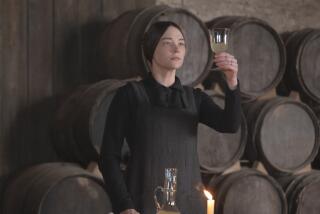MOVIE REVIEW : ‘ALEXINA’: A TRAGIC TALE OF A SOCIAL OUTCAST
- Share via
“The Mystery of Alexina” (at the Fine Arts) begins like something small, fine and pretty, a lyric of love’s awakening, set in the French countryside in the 1850s. Then it seems to turn pastel and perverse, later, to erupt in squalls of psychic trauma. Finally, it edges toward muted tragedy, low-key but devastating. That tragedy will be almost as wistful and fragile as the opening--like a frail melody, dying in shadows.
The story is true, based on the memoirs of French hermaphrodite Hercule Barbin, the “Alexina” of the title. Barbin’s memoirs were discovered and edited by the late philosopher/writer Michel Foucault. It was Foucault, who--pleased with writer-director Rene Feret’s film of “I, Pierre Riviere”--suggested Barbin as another ideal subject. Years later he approved the script, but died before seeing the film.
In the film, Alexina (played stunningly well by French caricaturist Vuillemin) is a “young woman” from a strict home, sent out as schoolmistress to a distant provincial town. Gradually, despite herself, she falls in love with her fellow teacher, Sara (Valerie Stroh), who succumbs, imagining Alexina’s androgynous body as that of a boy named “Camille.”
But after their relationship is revealed, the story becomes more than a real-life counterpart to Lillian Hellman’s “The Children’s Hour” (with, here, a spiteful child whose accusations are factual). Alexina’s dilemma is more complex--her gender puzzlingly indeterminate, the examining physicians in dispute. (The riddle of how she/he lasted, undetected, to late youth, is explained by her upbringing: a convent school where modesty was protected, a pious mother who refused to examine her at birth, perhaps a John Ford-style doctor too drunk to care.)
Complicating matters further is Alexina’s honest wish to fulfill society’s demands: to become a man, if necessary; to marry Sara, if possible. If Alexina’s religious education had not taken so well, and if she/he were not so scrupulous, the conflict might never have erupted. It’s a tragedy, like many others, that springs from a clash of individual character and social absolutes.
The story’s outline may suggest something voguishly prurient--fit for a portfolio of gauzy David Hamilton photographs, with scraps of italicized blank verse. But Feret, like his mentor, is interested in more than shocks on the surface. He and co-screenwriter Jean Gruault (“Mon Oncle d’Amerique”) are absorbed by the storms within.
Feret’s style reaches for the cool tenderness of the late Truffaut, even a Bressonian severity. He falls short, but the story fascinates. “Alexina” has moments of eroticism and poetry of the flesh--of lovemaking under a crucifix, surrounded by night winds or the piping of birds. But it’s never simply the fancy tease it might have been; it haunts you afterward. It’s a poetic-psychological inquiry into the wellsprings of sex and the traps society lays for its outsiders: anyone who, knowingly or not, stirs the muddy waters of the psyche, deep down where vulnerability, chaos and danger lie.
‘THE MYSTERY OF ALEXINA’
A European Classics release of a Cineastes Associes and TF 1 Films co-production. Producer Rene Feret. Director Feret. Script Jean Gruault, Feret. Camera Bernard Zittermann. Editor Ariane Boeglin. Costumes, sets Isabelle Manescau. Music Anne-Marie Deschamps. With Vuillemin, Valerie Stroh, Veronique Silver, Bernard Freyd, Pierre Vial, Marianne Basler.
Running time: 1 hour 26 minutes.
Times-rated: Mature (nudity, sexuality).
More to Read
Only good movies
Get the Indie Focus newsletter, Mark Olsen's weekly guide to the world of cinema.
You may occasionally receive promotional content from the Los Angeles Times.










